WorldCom Case Study: Ethical and Financial Analysis of WorldCom
VerifiedAdded on 2020/10/22
|19
|4087
|448
Case Study
AI Summary
This case study provides a comprehensive analysis of the WorldCom scandal, focusing on the ethical failures and financial discrepancies that led to the company's downfall. The analysis explores key issues such as hiding and misinterpreting information, the lack of protection for stakeholders, and the ethical pros and cons of banking practices. It also examines the implications of the Glass-Steagall Act and the Sarbanes-Oxley Act, highlighting the importance of ethical management, transparent accounting systems, and the role of whistleblowers in preventing financial fraud. The study emphasizes the need for financial and banking organizations to integrate ethics into their operational principles, ensuring compliance with regulations and protecting the interests of stakeholders. The case highlights how actions like lying and fudging to protect the company's image can have negative impacts. The analysis concludes that organizations must apply ethical standards, laws, and principles to reduce the impact of such actions and remain vigilant while performing operational activities. Additionally, it includes a project analysis of "How Obama Care Creates Ethical Conflicts for Physicians and How Patients can Protect Themselves".
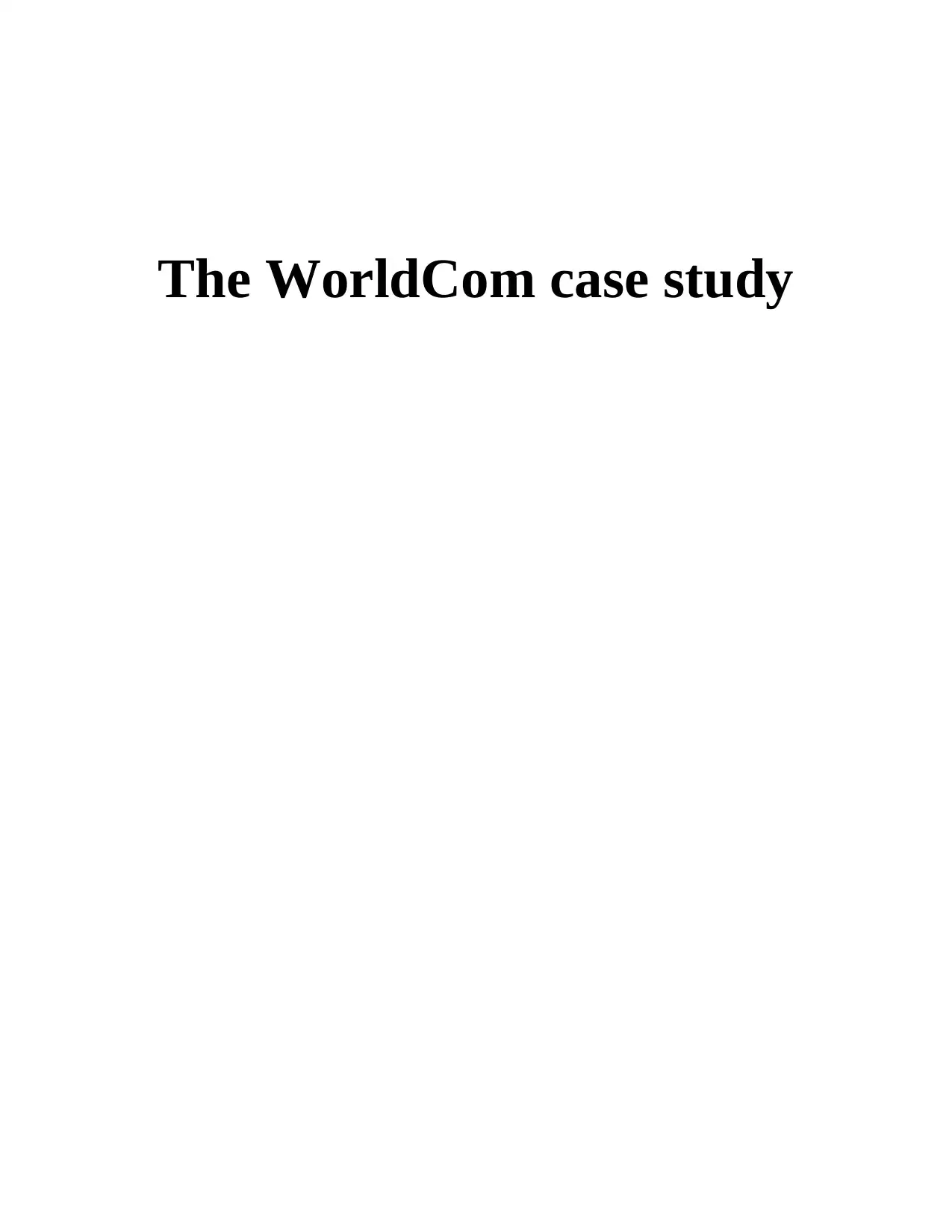
The WorldCom case study
Paraphrase This Document
Need a fresh take? Get an instant paraphrase of this document with our AI Paraphraser
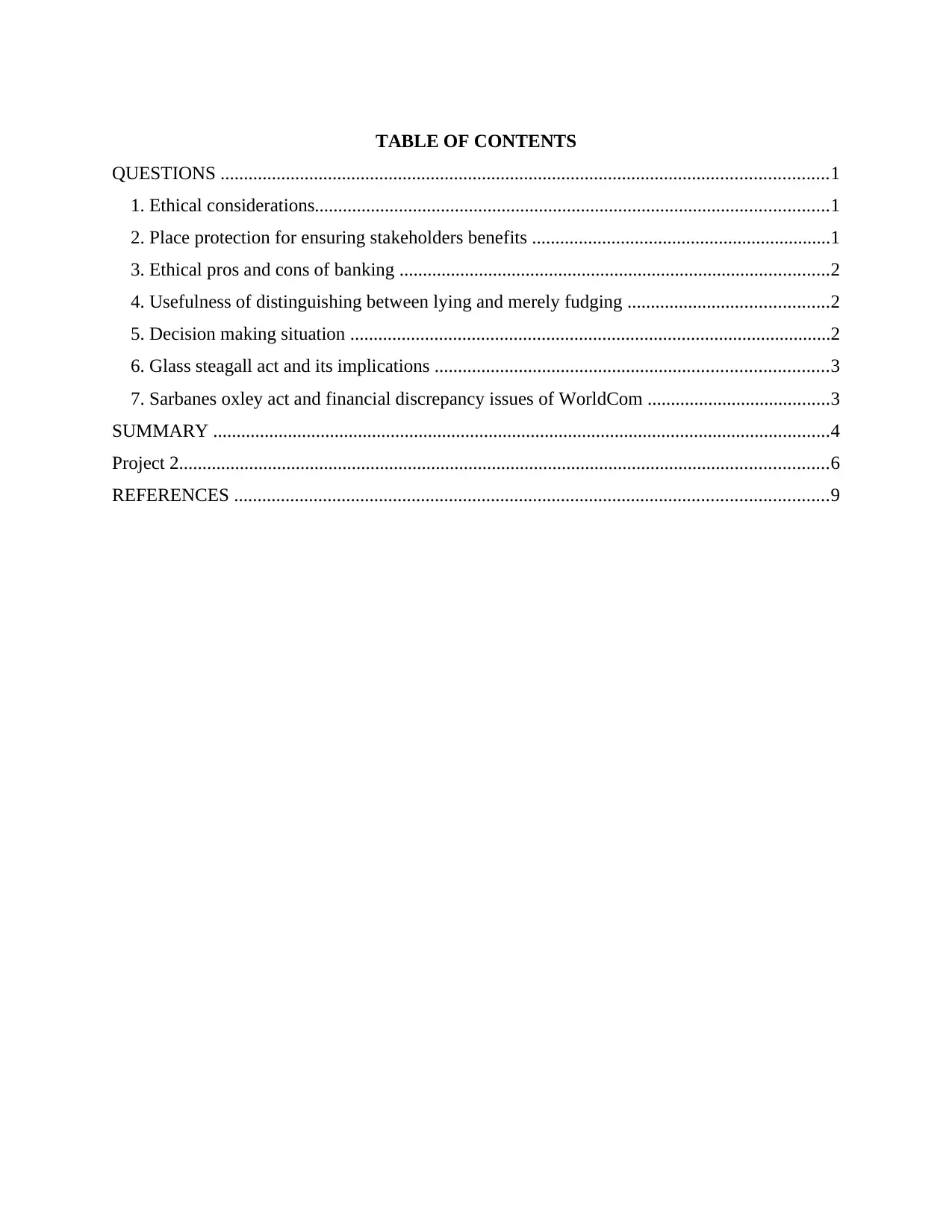
TABLE OF CONTENTS
QUESTIONS ..................................................................................................................................1
1. Ethical considerations..............................................................................................................1
2. Place protection for ensuring stakeholders benefits ................................................................1
3. Ethical pros and cons of banking ............................................................................................2
4. Usefulness of distinguishing between lying and merely fudging ...........................................2
5. Decision making situation .......................................................................................................2
6. Glass steagall act and its implications ....................................................................................3
7. Sarbanes oxley act and financial discrepancy issues of WorldCom .......................................3
SUMMARY ....................................................................................................................................4
Project 2...........................................................................................................................................6
REFERENCES ...............................................................................................................................9
QUESTIONS ..................................................................................................................................1
1. Ethical considerations..............................................................................................................1
2. Place protection for ensuring stakeholders benefits ................................................................1
3. Ethical pros and cons of banking ............................................................................................2
4. Usefulness of distinguishing between lying and merely fudging ...........................................2
5. Decision making situation .......................................................................................................2
6. Glass steagall act and its implications ....................................................................................3
7. Sarbanes oxley act and financial discrepancy issues of WorldCom .......................................3
SUMMARY ....................................................................................................................................4
Project 2...........................................................................................................................................6
REFERENCES ...............................................................................................................................9
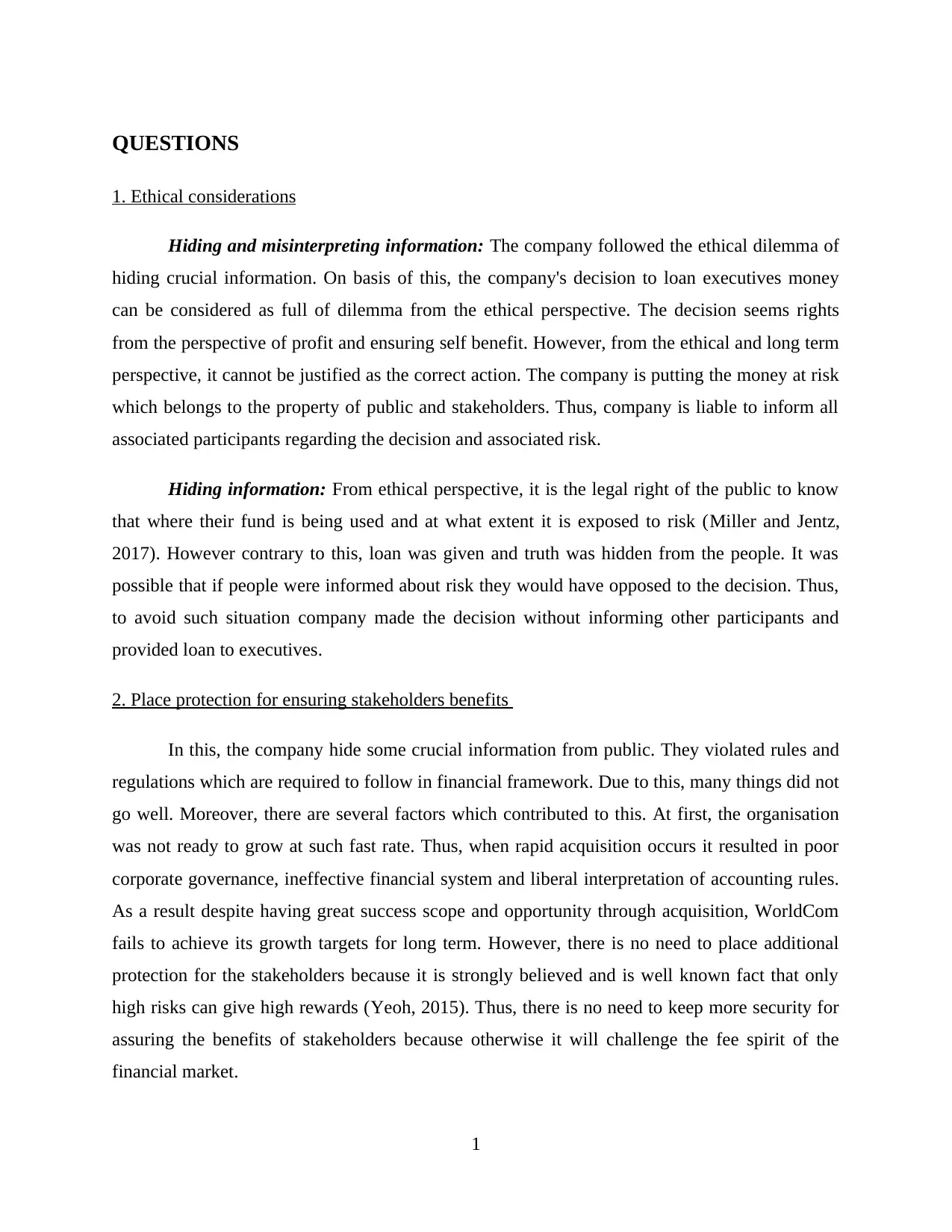
QUESTIONS
1. Ethical considerations
Hiding and misinterpreting information: The company followed the ethical dilemma of
hiding crucial information. On basis of this, the company's decision to loan executives money
can be considered as full of dilemma from the ethical perspective. The decision seems rights
from the perspective of profit and ensuring self benefit. However, from the ethical and long term
perspective, it cannot be justified as the correct action. The company is putting the money at risk
which belongs to the property of public and stakeholders. Thus, company is liable to inform all
associated participants regarding the decision and associated risk.
Hiding information: From ethical perspective, it is the legal right of the public to know
that where their fund is being used and at what extent it is exposed to risk (Miller and Jentz,
2017). However contrary to this, loan was given and truth was hidden from the people. It was
possible that if people were informed about risk they would have opposed to the decision. Thus,
to avoid such situation company made the decision without informing other participants and
provided loan to executives.
2. Place protection for ensuring stakeholders benefits
In this, the company hide some crucial information from public. They violated rules and
regulations which are required to follow in financial framework. Due to this, many things did not
go well. Moreover, there are several factors which contributed to this. At first, the organisation
was not ready to grow at such fast rate. Thus, when rapid acquisition occurs it resulted in poor
corporate governance, ineffective financial system and liberal interpretation of accounting rules.
As a result despite having great success scope and opportunity through acquisition, WorldCom
fails to achieve its growth targets for long term. However, there is no need to place additional
protection for the stakeholders because it is strongly believed and is well known fact that only
high risks can give high rewards (Yeoh, 2015). Thus, there is no need to keep more security for
assuring the benefits of stakeholders because otherwise it will challenge the fee spirit of the
financial market.
1
1. Ethical considerations
Hiding and misinterpreting information: The company followed the ethical dilemma of
hiding crucial information. On basis of this, the company's decision to loan executives money
can be considered as full of dilemma from the ethical perspective. The decision seems rights
from the perspective of profit and ensuring self benefit. However, from the ethical and long term
perspective, it cannot be justified as the correct action. The company is putting the money at risk
which belongs to the property of public and stakeholders. Thus, company is liable to inform all
associated participants regarding the decision and associated risk.
Hiding information: From ethical perspective, it is the legal right of the public to know
that where their fund is being used and at what extent it is exposed to risk (Miller and Jentz,
2017). However contrary to this, loan was given and truth was hidden from the people. It was
possible that if people were informed about risk they would have opposed to the decision. Thus,
to avoid such situation company made the decision without informing other participants and
provided loan to executives.
2. Place protection for ensuring stakeholders benefits
In this, the company hide some crucial information from public. They violated rules and
regulations which are required to follow in financial framework. Due to this, many things did not
go well. Moreover, there are several factors which contributed to this. At first, the organisation
was not ready to grow at such fast rate. Thus, when rapid acquisition occurs it resulted in poor
corporate governance, ineffective financial system and liberal interpretation of accounting rules.
As a result despite having great success scope and opportunity through acquisition, WorldCom
fails to achieve its growth targets for long term. However, there is no need to place additional
protection for the stakeholders because it is strongly believed and is well known fact that only
high risks can give high rewards (Yeoh, 2015). Thus, there is no need to keep more security for
assuring the benefits of stakeholders because otherwise it will challenge the fee spirit of the
financial market.
1
⊘ This is a preview!⊘
Do you want full access?
Subscribe today to unlock all pages.

Trusted by 1+ million students worldwide
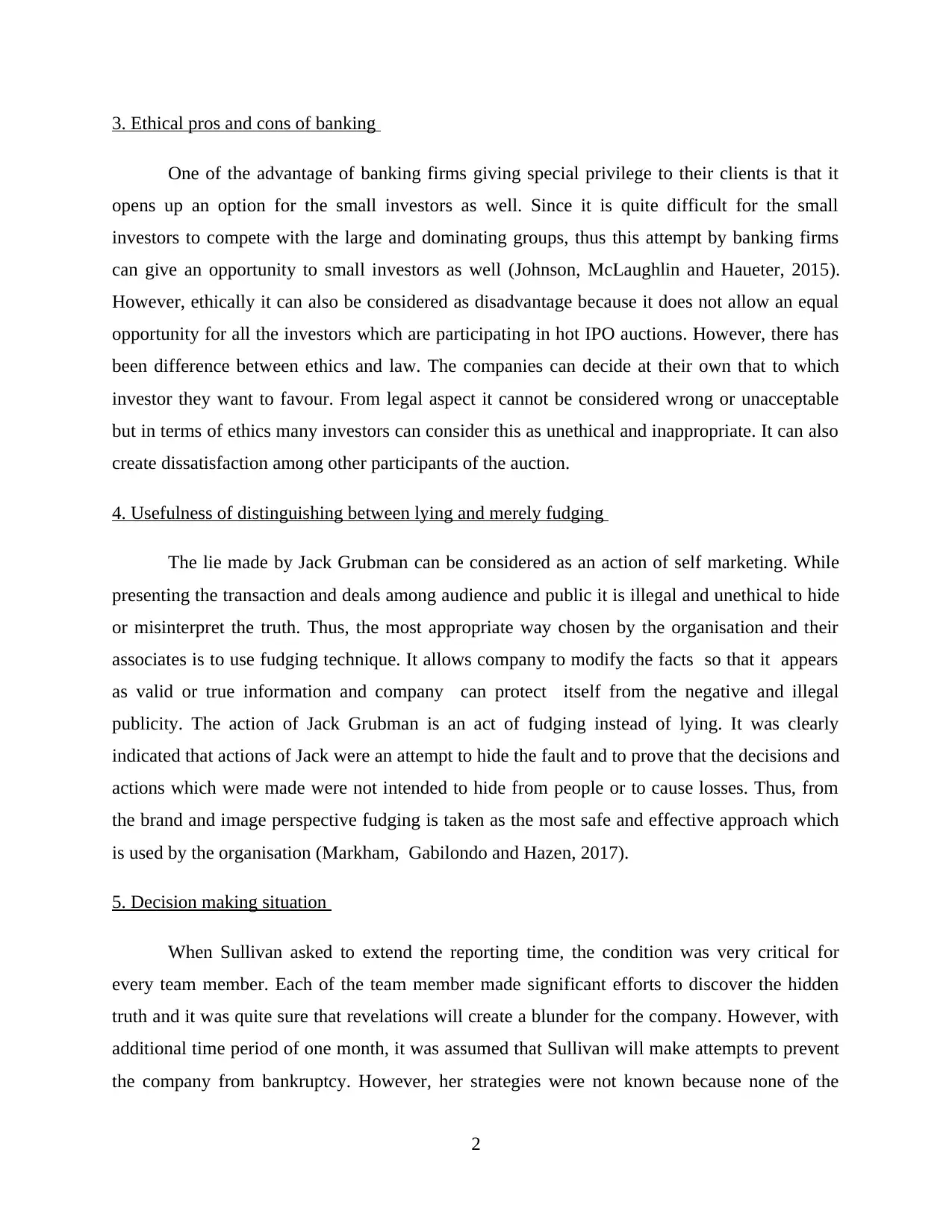
3. Ethical pros and cons of banking
One of the advantage of banking firms giving special privilege to their clients is that it
opens up an option for the small investors as well. Since it is quite difficult for the small
investors to compete with the large and dominating groups, thus this attempt by banking firms
can give an opportunity to small investors as well (Johnson, McLaughlin and Haueter, 2015).
However, ethically it can also be considered as disadvantage because it does not allow an equal
opportunity for all the investors which are participating in hot IPO auctions. However, there has
been difference between ethics and law. The companies can decide at their own that to which
investor they want to favour. From legal aspect it cannot be considered wrong or unacceptable
but in terms of ethics many investors can consider this as unethical and inappropriate. It can also
create dissatisfaction among other participants of the auction.
4. Usefulness of distinguishing between lying and merely fudging
The lie made by Jack Grubman can be considered as an action of self marketing. While
presenting the transaction and deals among audience and public it is illegal and unethical to hide
or misinterpret the truth. Thus, the most appropriate way chosen by the organisation and their
associates is to use fudging technique. It allows company to modify the facts so that it appears
as valid or true information and company can protect itself from the negative and illegal
publicity. The action of Jack Grubman is an act of fudging instead of lying. It was clearly
indicated that actions of Jack were an attempt to hide the fault and to prove that the decisions and
actions which were made were not intended to hide from people or to cause losses. Thus, from
the brand and image perspective fudging is taken as the most safe and effective approach which
is used by the organisation (Markham, Gabilondo and Hazen, 2017).
5. Decision making situation
When Sullivan asked to extend the reporting time, the condition was very critical for
every team member. Each of the team member made significant efforts to discover the hidden
truth and it was quite sure that revelations will create a blunder for the company. However, with
additional time period of one month, it was assumed that Sullivan will make attempts to prevent
the company from bankruptcy. However, her strategies were not known because none of the
2
One of the advantage of banking firms giving special privilege to their clients is that it
opens up an option for the small investors as well. Since it is quite difficult for the small
investors to compete with the large and dominating groups, thus this attempt by banking firms
can give an opportunity to small investors as well (Johnson, McLaughlin and Haueter, 2015).
However, ethically it can also be considered as disadvantage because it does not allow an equal
opportunity for all the investors which are participating in hot IPO auctions. However, there has
been difference between ethics and law. The companies can decide at their own that to which
investor they want to favour. From legal aspect it cannot be considered wrong or unacceptable
but in terms of ethics many investors can consider this as unethical and inappropriate. It can also
create dissatisfaction among other participants of the auction.
4. Usefulness of distinguishing between lying and merely fudging
The lie made by Jack Grubman can be considered as an action of self marketing. While
presenting the transaction and deals among audience and public it is illegal and unethical to hide
or misinterpret the truth. Thus, the most appropriate way chosen by the organisation and their
associates is to use fudging technique. It allows company to modify the facts so that it appears
as valid or true information and company can protect itself from the negative and illegal
publicity. The action of Jack Grubman is an act of fudging instead of lying. It was clearly
indicated that actions of Jack were an attempt to hide the fault and to prove that the decisions and
actions which were made were not intended to hide from people or to cause losses. Thus, from
the brand and image perspective fudging is taken as the most safe and effective approach which
is used by the organisation (Markham, Gabilondo and Hazen, 2017).
5. Decision making situation
When Sullivan asked to extend the reporting time, the condition was very critical for
every team member. Each of the team member made significant efforts to discover the hidden
truth and it was quite sure that revelations will create a blunder for the company. However, with
additional time period of one month, it was assumed that Sullivan will make attempts to prevent
the company from bankruptcy. However, her strategies were not known because none of the
2
Paraphrase This Document
Need a fresh take? Get an instant paraphrase of this document with our AI Paraphraser
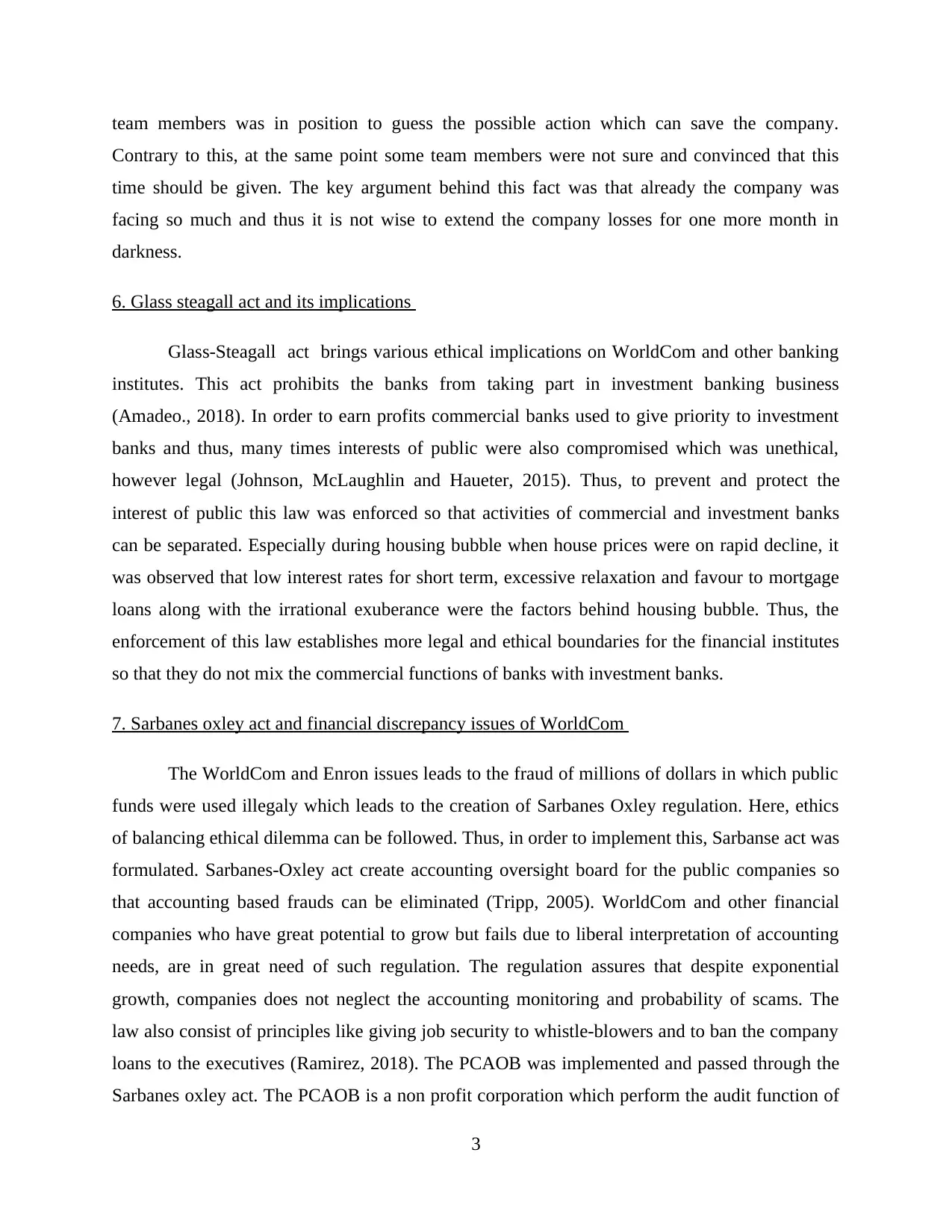
team members was in position to guess the possible action which can save the company.
Contrary to this, at the same point some team members were not sure and convinced that this
time should be given. The key argument behind this fact was that already the company was
facing so much and thus it is not wise to extend the company losses for one more month in
darkness.
6. Glass steagall act and its implications
Glass-Steagall act brings various ethical implications on WorldCom and other banking
institutes. This act prohibits the banks from taking part in investment banking business
(Amadeo., 2018). In order to earn profits commercial banks used to give priority to investment
banks and thus, many times interests of public were also compromised which was unethical,
however legal (Johnson, McLaughlin and Haueter, 2015). Thus, to prevent and protect the
interest of public this law was enforced so that activities of commercial and investment banks
can be separated. Especially during housing bubble when house prices were on rapid decline, it
was observed that low interest rates for short term, excessive relaxation and favour to mortgage
loans along with the irrational exuberance were the factors behind housing bubble. Thus, the
enforcement of this law establishes more legal and ethical boundaries for the financial institutes
so that they do not mix the commercial functions of banks with investment banks.
7. Sarbanes oxley act and financial discrepancy issues of WorldCom
The WorldCom and Enron issues leads to the fraud of millions of dollars in which public
funds were used illegaly which leads to the creation of Sarbanes Oxley regulation. Here, ethics
of balancing ethical dilemma can be followed. Thus, in order to implement this, Sarbanse act was
formulated. Sarbanes-Oxley act create accounting oversight board for the public companies so
that accounting based frauds can be eliminated (Tripp, 2005). WorldCom and other financial
companies who have great potential to grow but fails due to liberal interpretation of accounting
needs, are in great need of such regulation. The regulation assures that despite exponential
growth, companies does not neglect the accounting monitoring and probability of scams. The
law also consist of principles like giving job security to whistle-blowers and to ban the company
loans to the executives (Ramirez, 2018). The PCAOB was implemented and passed through the
Sarbanes oxley act. The PCAOB is a non profit corporation which perform the audit function of
3
Contrary to this, at the same point some team members were not sure and convinced that this
time should be given. The key argument behind this fact was that already the company was
facing so much and thus it is not wise to extend the company losses for one more month in
darkness.
6. Glass steagall act and its implications
Glass-Steagall act brings various ethical implications on WorldCom and other banking
institutes. This act prohibits the banks from taking part in investment banking business
(Amadeo., 2018). In order to earn profits commercial banks used to give priority to investment
banks and thus, many times interests of public were also compromised which was unethical,
however legal (Johnson, McLaughlin and Haueter, 2015). Thus, to prevent and protect the
interest of public this law was enforced so that activities of commercial and investment banks
can be separated. Especially during housing bubble when house prices were on rapid decline, it
was observed that low interest rates for short term, excessive relaxation and favour to mortgage
loans along with the irrational exuberance were the factors behind housing bubble. Thus, the
enforcement of this law establishes more legal and ethical boundaries for the financial institutes
so that they do not mix the commercial functions of banks with investment banks.
7. Sarbanes oxley act and financial discrepancy issues of WorldCom
The WorldCom and Enron issues leads to the fraud of millions of dollars in which public
funds were used illegaly which leads to the creation of Sarbanes Oxley regulation. Here, ethics
of balancing ethical dilemma can be followed. Thus, in order to implement this, Sarbanse act was
formulated. Sarbanes-Oxley act create accounting oversight board for the public companies so
that accounting based frauds can be eliminated (Tripp, 2005). WorldCom and other financial
companies who have great potential to grow but fails due to liberal interpretation of accounting
needs, are in great need of such regulation. The regulation assures that despite exponential
growth, companies does not neglect the accounting monitoring and probability of scams. The
law also consist of principles like giving job security to whistle-blowers and to ban the company
loans to the executives (Ramirez, 2018). The PCAOB was implemented and passed through the
Sarbanes oxley act. The PCAOB is a non profit corporation which perform the audit function of
3
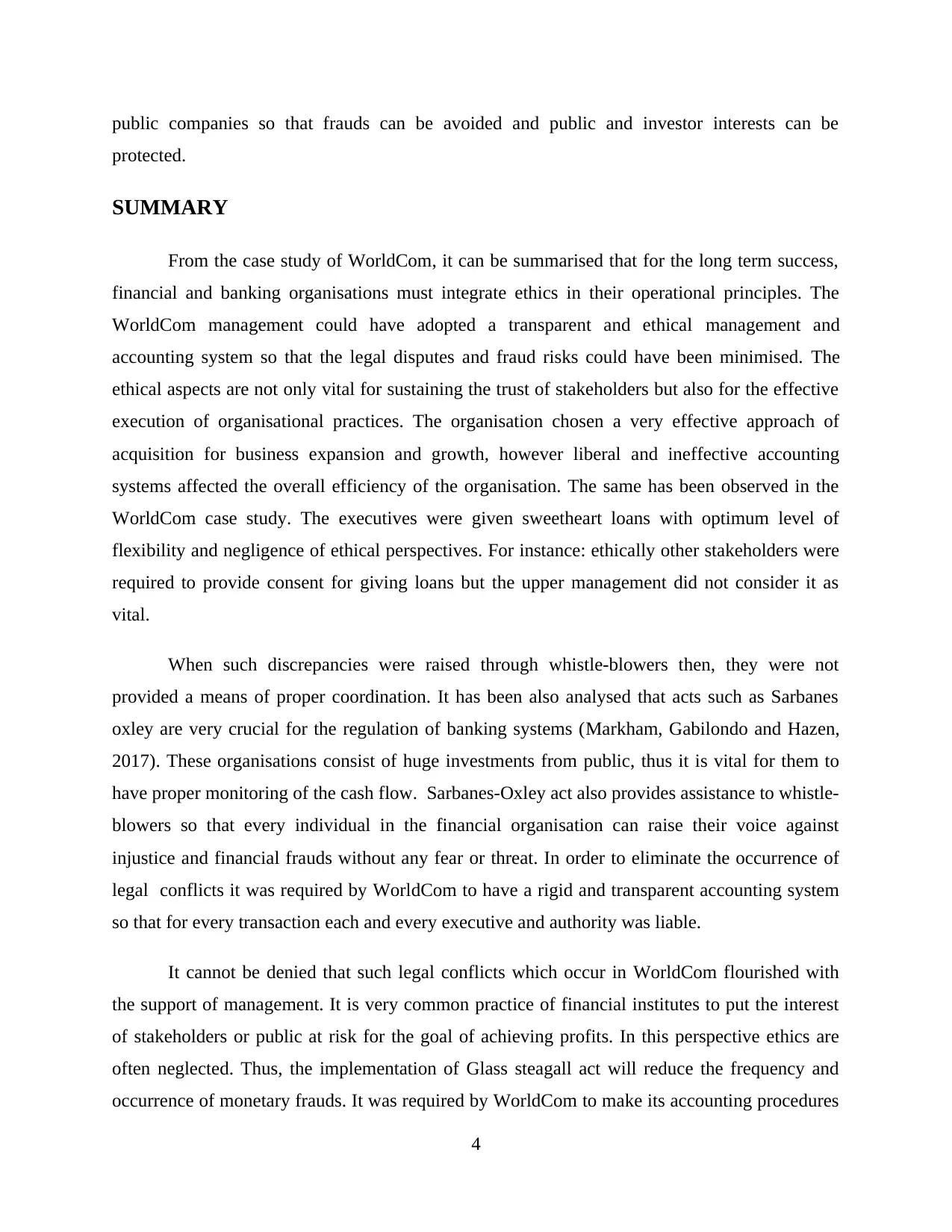
public companies so that frauds can be avoided and public and investor interests can be
protected.
SUMMARY
From the case study of WorldCom, it can be summarised that for the long term success,
financial and banking organisations must integrate ethics in their operational principles. The
WorldCom management could have adopted a transparent and ethical management and
accounting system so that the legal disputes and fraud risks could have been minimised. The
ethical aspects are not only vital for sustaining the trust of stakeholders but also for the effective
execution of organisational practices. The organisation chosen a very effective approach of
acquisition for business expansion and growth, however liberal and ineffective accounting
systems affected the overall efficiency of the organisation. The same has been observed in the
WorldCom case study. The executives were given sweetheart loans with optimum level of
flexibility and negligence of ethical perspectives. For instance: ethically other stakeholders were
required to provide consent for giving loans but the upper management did not consider it as
vital.
When such discrepancies were raised through whistle-blowers then, they were not
provided a means of proper coordination. It has been also analysed that acts such as Sarbanes
oxley are very crucial for the regulation of banking systems (Markham, Gabilondo and Hazen,
2017). These organisations consist of huge investments from public, thus it is vital for them to
have proper monitoring of the cash flow. Sarbanes-Oxley act also provides assistance to whistle-
blowers so that every individual in the financial organisation can raise their voice against
injustice and financial frauds without any fear or threat. In order to eliminate the occurrence of
legal conflicts it was required by WorldCom to have a rigid and transparent accounting system
so that for every transaction each and every executive and authority was liable.
It cannot be denied that such legal conflicts which occur in WorldCom flourished with
the support of management. It is very common practice of financial institutes to put the interest
of stakeholders or public at risk for the goal of achieving profits. In this perspective ethics are
often neglected. Thus, the implementation of Glass steagall act will reduce the frequency and
occurrence of monetary frauds. It was required by WorldCom to make its accounting procedures
4
protected.
SUMMARY
From the case study of WorldCom, it can be summarised that for the long term success,
financial and banking organisations must integrate ethics in their operational principles. The
WorldCom management could have adopted a transparent and ethical management and
accounting system so that the legal disputes and fraud risks could have been minimised. The
ethical aspects are not only vital for sustaining the trust of stakeholders but also for the effective
execution of organisational practices. The organisation chosen a very effective approach of
acquisition for business expansion and growth, however liberal and ineffective accounting
systems affected the overall efficiency of the organisation. The same has been observed in the
WorldCom case study. The executives were given sweetheart loans with optimum level of
flexibility and negligence of ethical perspectives. For instance: ethically other stakeholders were
required to provide consent for giving loans but the upper management did not consider it as
vital.
When such discrepancies were raised through whistle-blowers then, they were not
provided a means of proper coordination. It has been also analysed that acts such as Sarbanes
oxley are very crucial for the regulation of banking systems (Markham, Gabilondo and Hazen,
2017). These organisations consist of huge investments from public, thus it is vital for them to
have proper monitoring of the cash flow. Sarbanes-Oxley act also provides assistance to whistle-
blowers so that every individual in the financial organisation can raise their voice against
injustice and financial frauds without any fear or threat. In order to eliminate the occurrence of
legal conflicts it was required by WorldCom to have a rigid and transparent accounting system
so that for every transaction each and every executive and authority was liable.
It cannot be denied that such legal conflicts which occur in WorldCom flourished with
the support of management. It is very common practice of financial institutes to put the interest
of stakeholders or public at risk for the goal of achieving profits. In this perspective ethics are
often neglected. Thus, the implementation of Glass steagall act will reduce the frequency and
occurrence of monetary frauds. It was required by WorldCom to make its accounting procedures
4
⊘ This is a preview!⊘
Do you want full access?
Subscribe today to unlock all pages.

Trusted by 1+ million students worldwide
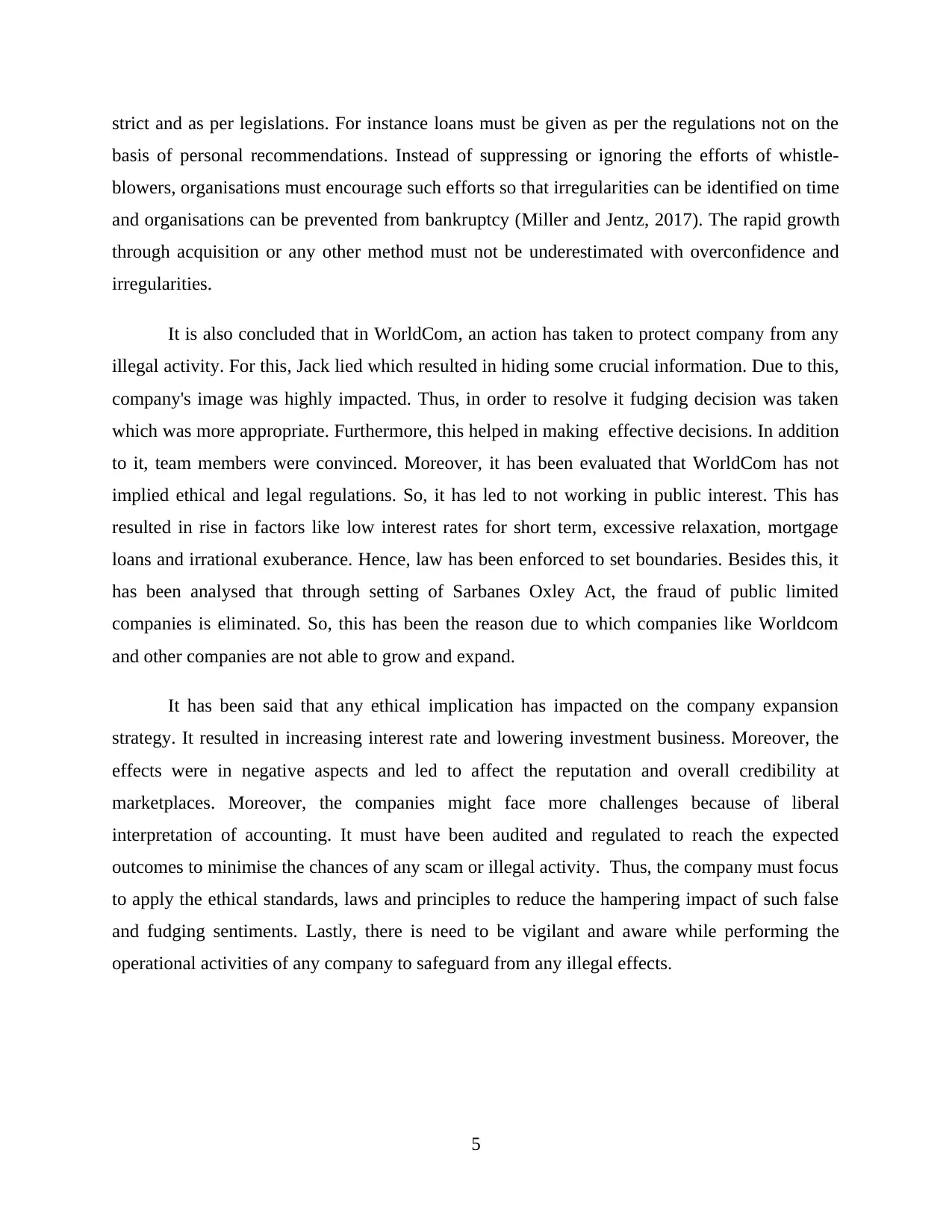
strict and as per legislations. For instance loans must be given as per the regulations not on the
basis of personal recommendations. Instead of suppressing or ignoring the efforts of whistle-
blowers, organisations must encourage such efforts so that irregularities can be identified on time
and organisations can be prevented from bankruptcy (Miller and Jentz, 2017). The rapid growth
through acquisition or any other method must not be underestimated with overconfidence and
irregularities.
It is also concluded that in WorldCom, an action has taken to protect company from any
illegal activity. For this, Jack lied which resulted in hiding some crucial information. Due to this,
company's image was highly impacted. Thus, in order to resolve it fudging decision was taken
which was more appropriate. Furthermore, this helped in making effective decisions. In addition
to it, team members were convinced. Moreover, it has been evaluated that WorldCom has not
implied ethical and legal regulations. So, it has led to not working in public interest. This has
resulted in rise in factors like low interest rates for short term, excessive relaxation, mortgage
loans and irrational exuberance. Hence, law has been enforced to set boundaries. Besides this, it
has been analysed that through setting of Sarbanes Oxley Act, the fraud of public limited
companies is eliminated. So, this has been the reason due to which companies like Worldcom
and other companies are not able to grow and expand.
It has been said that any ethical implication has impacted on the company expansion
strategy. It resulted in increasing interest rate and lowering investment business. Moreover, the
effects were in negative aspects and led to affect the reputation and overall credibility at
marketplaces. Moreover, the companies might face more challenges because of liberal
interpretation of accounting. It must have been audited and regulated to reach the expected
outcomes to minimise the chances of any scam or illegal activity. Thus, the company must focus
to apply the ethical standards, laws and principles to reduce the hampering impact of such false
and fudging sentiments. Lastly, there is need to be vigilant and aware while performing the
operational activities of any company to safeguard from any illegal effects.
5
basis of personal recommendations. Instead of suppressing or ignoring the efforts of whistle-
blowers, organisations must encourage such efforts so that irregularities can be identified on time
and organisations can be prevented from bankruptcy (Miller and Jentz, 2017). The rapid growth
through acquisition or any other method must not be underestimated with overconfidence and
irregularities.
It is also concluded that in WorldCom, an action has taken to protect company from any
illegal activity. For this, Jack lied which resulted in hiding some crucial information. Due to this,
company's image was highly impacted. Thus, in order to resolve it fudging decision was taken
which was more appropriate. Furthermore, this helped in making effective decisions. In addition
to it, team members were convinced. Moreover, it has been evaluated that WorldCom has not
implied ethical and legal regulations. So, it has led to not working in public interest. This has
resulted in rise in factors like low interest rates for short term, excessive relaxation, mortgage
loans and irrational exuberance. Hence, law has been enforced to set boundaries. Besides this, it
has been analysed that through setting of Sarbanes Oxley Act, the fraud of public limited
companies is eliminated. So, this has been the reason due to which companies like Worldcom
and other companies are not able to grow and expand.
It has been said that any ethical implication has impacted on the company expansion
strategy. It resulted in increasing interest rate and lowering investment business. Moreover, the
effects were in negative aspects and led to affect the reputation and overall credibility at
marketplaces. Moreover, the companies might face more challenges because of liberal
interpretation of accounting. It must have been audited and regulated to reach the expected
outcomes to minimise the chances of any scam or illegal activity. Thus, the company must focus
to apply the ethical standards, laws and principles to reduce the hampering impact of such false
and fudging sentiments. Lastly, there is need to be vigilant and aware while performing the
operational activities of any company to safeguard from any illegal effects.
5
Paraphrase This Document
Need a fresh take? Get an instant paraphrase of this document with our AI Paraphraser
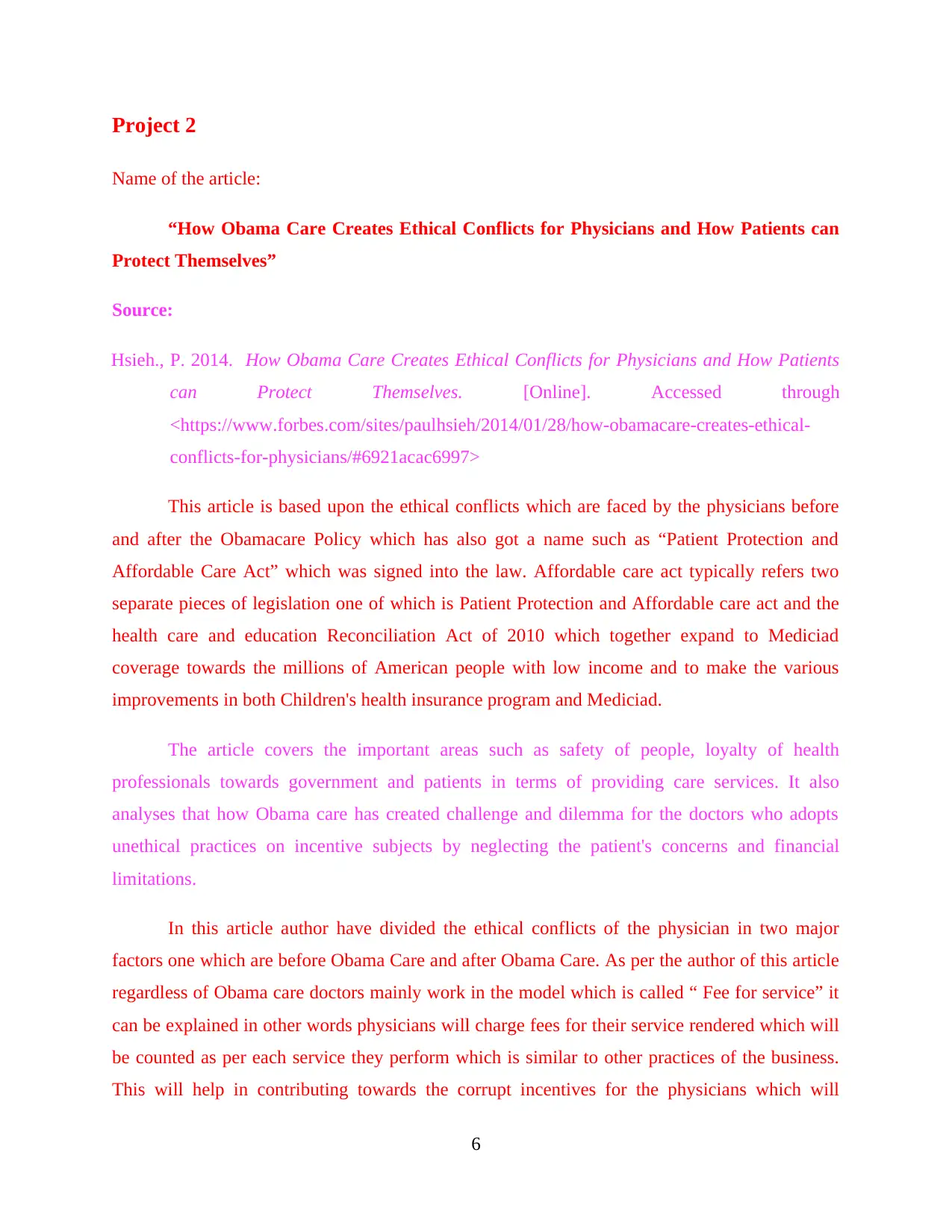
Project 2
Name of the article:
“How Obama Care Creates Ethical Conflicts for Physicians and How Patients can
Protect Themselves”
Source:
Hsieh., P. 2014. How Obama Care Creates Ethical Conflicts for Physicians and How Patients
can Protect Themselves. [Online]. Accessed through
<https://www.forbes.com/sites/paulhsieh/2014/01/28/how-obamacare-creates-ethical-
conflicts-for-physicians/#6921acac6997>
This article is based upon the ethical conflicts which are faced by the physicians before
and after the Obamacare Policy which has also got a name such as “Patient Protection and
Affordable Care Act” which was signed into the law. Affordable care act typically refers two
separate pieces of legislation one of which is Patient Protection and Affordable care act and the
health care and education Reconciliation Act of 2010 which together expand to Mediciad
coverage towards the millions of American people with low income and to make the various
improvements in both Children's health insurance program and Mediciad.
The article covers the important areas such as safety of people, loyalty of health
professionals towards government and patients in terms of providing care services. It also
analyses that how Obama care has created challenge and dilemma for the doctors who adopts
unethical practices on incentive subjects by neglecting the patient's concerns and financial
limitations.
In this article author have divided the ethical conflicts of the physician in two major
factors one which are before Obama Care and after Obama Care. As per the author of this article
regardless of Obama care doctors mainly work in the model which is called “ Fee for service” it
can be explained in other words physicians will charge fees for their service rendered which will
be counted as per each service they perform which is similar to other practices of the business.
This will help in contributing towards the corrupt incentives for the physicians which will
6
Name of the article:
“How Obama Care Creates Ethical Conflicts for Physicians and How Patients can
Protect Themselves”
Source:
Hsieh., P. 2014. How Obama Care Creates Ethical Conflicts for Physicians and How Patients
can Protect Themselves. [Online]. Accessed through
<https://www.forbes.com/sites/paulhsieh/2014/01/28/how-obamacare-creates-ethical-
conflicts-for-physicians/#6921acac6997>
This article is based upon the ethical conflicts which are faced by the physicians before
and after the Obamacare Policy which has also got a name such as “Patient Protection and
Affordable Care Act” which was signed into the law. Affordable care act typically refers two
separate pieces of legislation one of which is Patient Protection and Affordable care act and the
health care and education Reconciliation Act of 2010 which together expand to Mediciad
coverage towards the millions of American people with low income and to make the various
improvements in both Children's health insurance program and Mediciad.
The article covers the important areas such as safety of people, loyalty of health
professionals towards government and patients in terms of providing care services. It also
analyses that how Obama care has created challenge and dilemma for the doctors who adopts
unethical practices on incentive subjects by neglecting the patient's concerns and financial
limitations.
In this article author have divided the ethical conflicts of the physician in two major
factors one which are before Obama Care and after Obama Care. As per the author of this article
regardless of Obama care doctors mainly work in the model which is called “ Fee for service” it
can be explained in other words physicians will charge fees for their service rendered which will
be counted as per each service they perform which is similar to other practices of the business.
This will help in contributing towards the corrupt incentives for the physicians which will
6
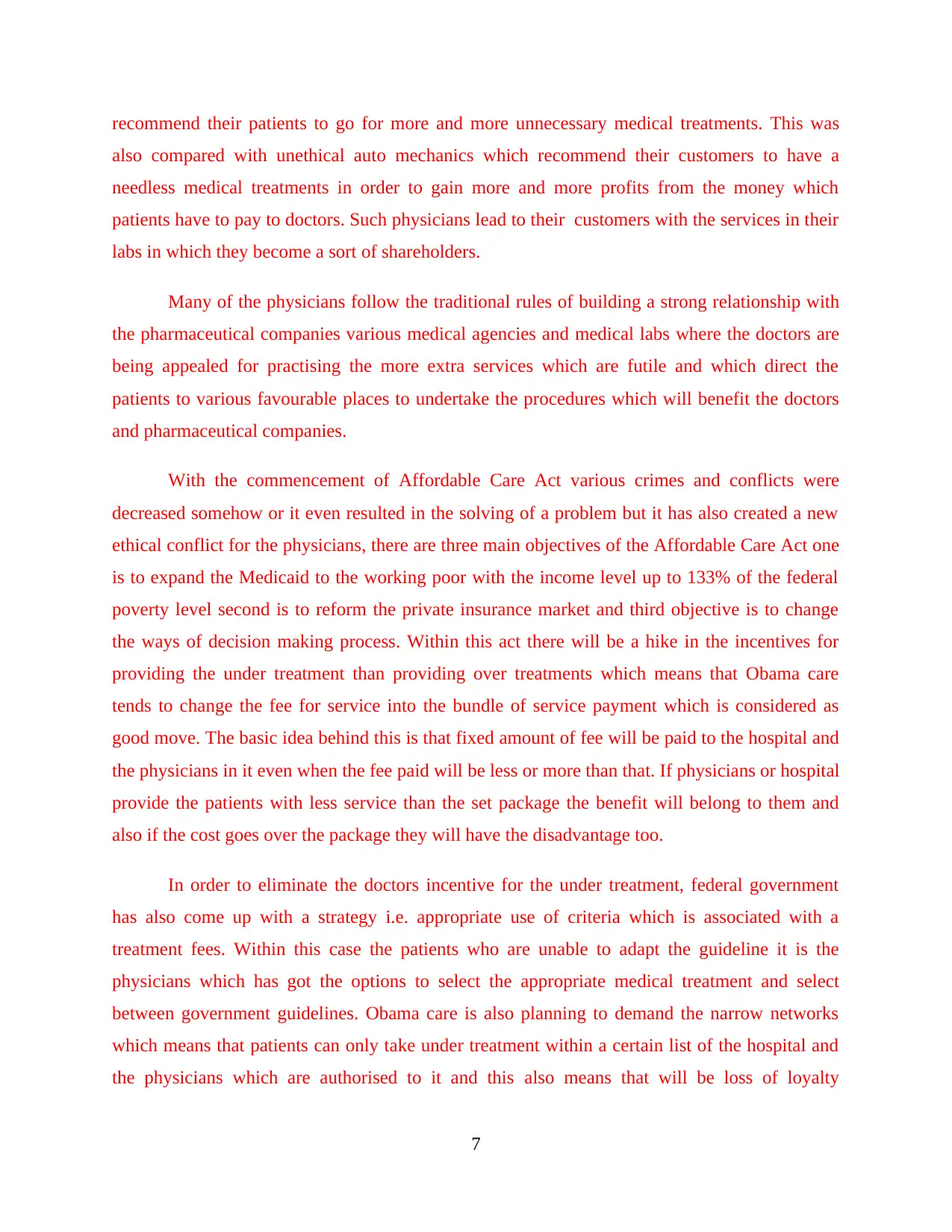
recommend their patients to go for more and more unnecessary medical treatments. This was
also compared with unethical auto mechanics which recommend their customers to have a
needless medical treatments in order to gain more and more profits from the money which
patients have to pay to doctors. Such physicians lead to their customers with the services in their
labs in which they become a sort of shareholders.
Many of the physicians follow the traditional rules of building a strong relationship with
the pharmaceutical companies various medical agencies and medical labs where the doctors are
being appealed for practising the more extra services which are futile and which direct the
patients to various favourable places to undertake the procedures which will benefit the doctors
and pharmaceutical companies.
With the commencement of Affordable Care Act various crimes and conflicts were
decreased somehow or it even resulted in the solving of a problem but it has also created a new
ethical conflict for the physicians, there are three main objectives of the Affordable Care Act one
is to expand the Medicaid to the working poor with the income level up to 133% of the federal
poverty level second is to reform the private insurance market and third objective is to change
the ways of decision making process. Within this act there will be a hike in the incentives for
providing the under treatment than providing over treatments which means that Obama care
tends to change the fee for service into the bundle of service payment which is considered as
good move. The basic idea behind this is that fixed amount of fee will be paid to the hospital and
the physicians in it even when the fee paid will be less or more than that. If physicians or hospital
provide the patients with less service than the set package the benefit will belong to them and
also if the cost goes over the package they will have the disadvantage too.
In order to eliminate the doctors incentive for the under treatment, federal government
has also come up with a strategy i.e. appropriate use of criteria which is associated with a
treatment fees. Within this case the patients who are unable to adapt the guideline it is the
physicians which has got the options to select the appropriate medical treatment and select
between government guidelines. Obama care is also planning to demand the narrow networks
which means that patients can only take under treatment within a certain list of the hospital and
the physicians which are authorised to it and this also means that will be loss of loyalty
7
also compared with unethical auto mechanics which recommend their customers to have a
needless medical treatments in order to gain more and more profits from the money which
patients have to pay to doctors. Such physicians lead to their customers with the services in their
labs in which they become a sort of shareholders.
Many of the physicians follow the traditional rules of building a strong relationship with
the pharmaceutical companies various medical agencies and medical labs where the doctors are
being appealed for practising the more extra services which are futile and which direct the
patients to various favourable places to undertake the procedures which will benefit the doctors
and pharmaceutical companies.
With the commencement of Affordable Care Act various crimes and conflicts were
decreased somehow or it even resulted in the solving of a problem but it has also created a new
ethical conflict for the physicians, there are three main objectives of the Affordable Care Act one
is to expand the Medicaid to the working poor with the income level up to 133% of the federal
poverty level second is to reform the private insurance market and third objective is to change
the ways of decision making process. Within this act there will be a hike in the incentives for
providing the under treatment than providing over treatments which means that Obama care
tends to change the fee for service into the bundle of service payment which is considered as
good move. The basic idea behind this is that fixed amount of fee will be paid to the hospital and
the physicians in it even when the fee paid will be less or more than that. If physicians or hospital
provide the patients with less service than the set package the benefit will belong to them and
also if the cost goes over the package they will have the disadvantage too.
In order to eliminate the doctors incentive for the under treatment, federal government
has also come up with a strategy i.e. appropriate use of criteria which is associated with a
treatment fees. Within this case the patients who are unable to adapt the guideline it is the
physicians which has got the options to select the appropriate medical treatment and select
between government guidelines. Obama care is also planning to demand the narrow networks
which means that patients can only take under treatment within a certain list of the hospital and
the physicians which are authorised to it and this also means that will be loss of loyalty
7
⊘ This is a preview!⊘
Do you want full access?
Subscribe today to unlock all pages.

Trusted by 1+ million students worldwide
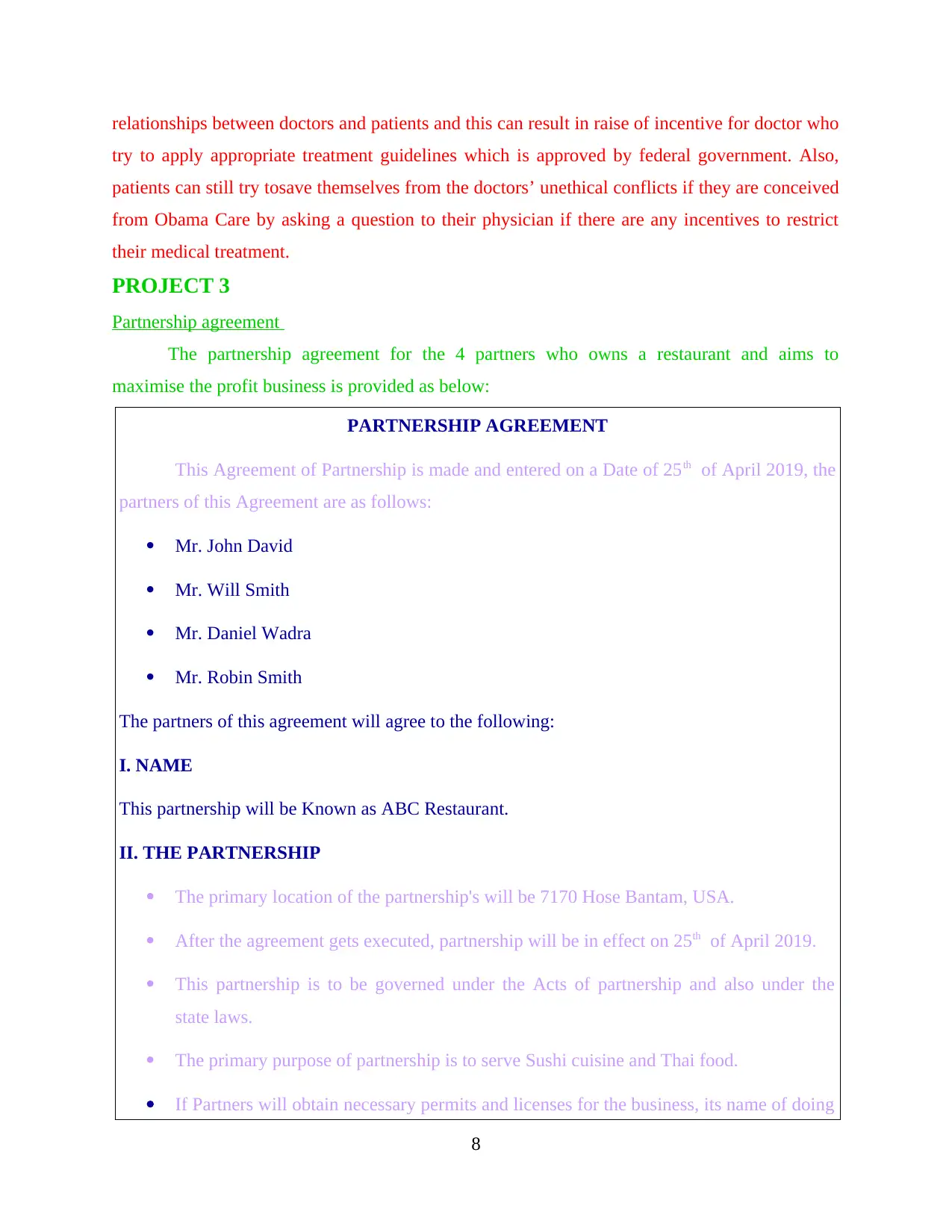
relationships between doctors and patients and this can result in raise of incentive for doctor who
try to apply appropriate treatment guidelines which is approved by federal government. Also,
patients can still try tosave themselves from the doctors’ unethical conflicts if they are conceived
from Obama Care by asking a question to their physician if there are any incentives to restrict
their medical treatment.
PROJECT 3
Partnership agreement
The partnership agreement for the 4 partners who owns a restaurant and aims to
maximise the profit business is provided as below:
PARTNERSHIP AGREEMENT
This Agreement of Partnership is made and entered on a Date of 25th of April 2019, the
partners of this Agreement are as follows:
Mr. John David
Mr. Will Smith
Mr. Daniel Wadra
Mr. Robin Smith
The partners of this agreement will agree to the following:
I. NAME
This partnership will be Known as ABC Restaurant.
II. THE PARTNERSHIP
The primary location of the partnership's will be 7170 Hose Bantam, USA.
After the agreement gets executed, partnership will be in effect on 25th of April 2019.
This partnership is to be governed under the Acts of partnership and also under the
state laws.
The primary purpose of partnership is to serve Sushi cuisine and Thai food.
If Partners will obtain necessary permits and licenses for the business, its name of doing
8
try to apply appropriate treatment guidelines which is approved by federal government. Also,
patients can still try tosave themselves from the doctors’ unethical conflicts if they are conceived
from Obama Care by asking a question to their physician if there are any incentives to restrict
their medical treatment.
PROJECT 3
Partnership agreement
The partnership agreement for the 4 partners who owns a restaurant and aims to
maximise the profit business is provided as below:
PARTNERSHIP AGREEMENT
This Agreement of Partnership is made and entered on a Date of 25th of April 2019, the
partners of this Agreement are as follows:
Mr. John David
Mr. Will Smith
Mr. Daniel Wadra
Mr. Robin Smith
The partners of this agreement will agree to the following:
I. NAME
This partnership will be Known as ABC Restaurant.
II. THE PARTNERSHIP
The primary location of the partnership's will be 7170 Hose Bantam, USA.
After the agreement gets executed, partnership will be in effect on 25th of April 2019.
This partnership is to be governed under the Acts of partnership and also under the
state laws.
The primary purpose of partnership is to serve Sushi cuisine and Thai food.
If Partners will obtain necessary permits and licenses for the business, its name of doing
8
Paraphrase This Document
Need a fresh take? Get an instant paraphrase of this document with our AI Paraphraser
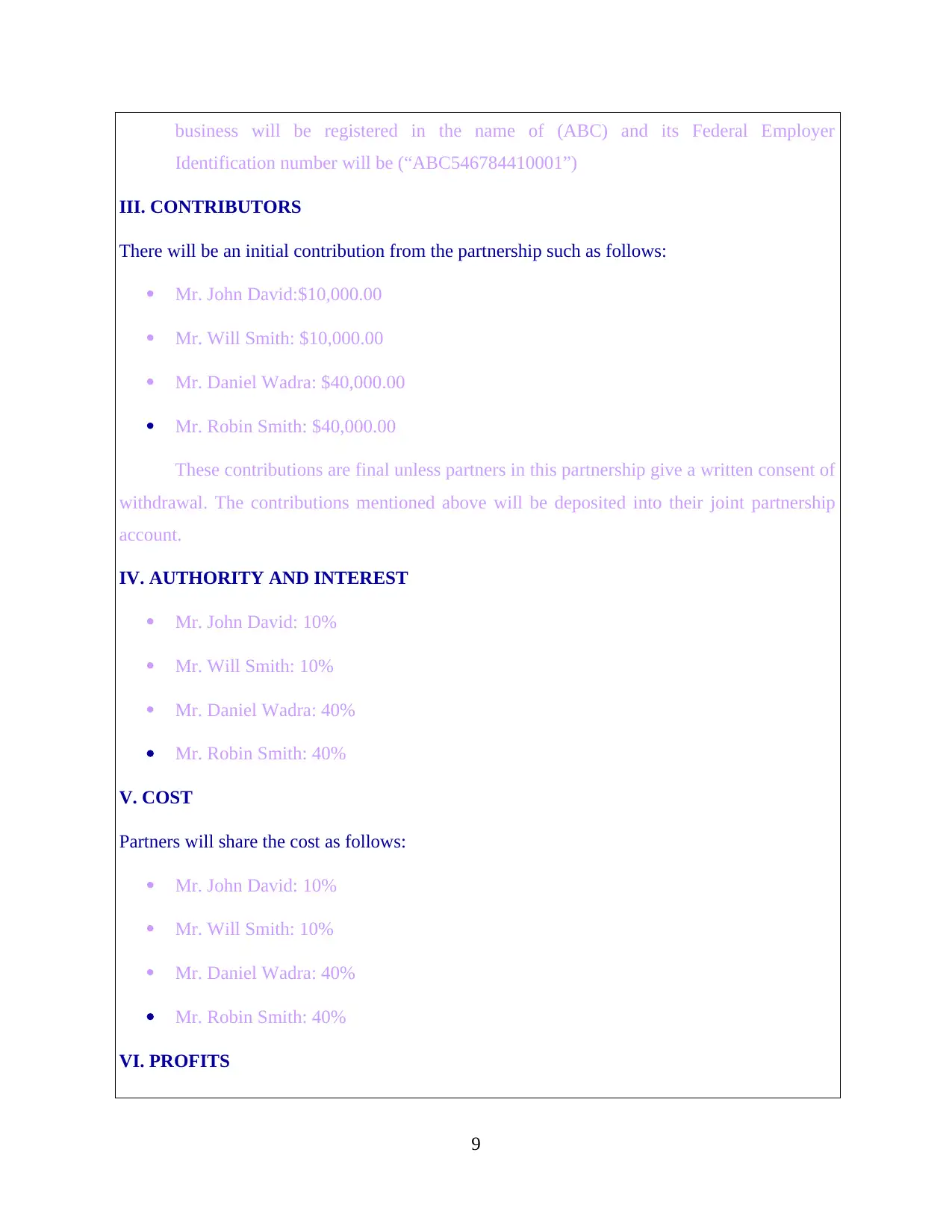
business will be registered in the name of (ABC) and its Federal Employer
Identification number will be (“ABC546784410001”)
III. CONTRIBUTORS
There will be an initial contribution from the partnership such as follows:
Mr. John David:$10,000.00
Mr. Will Smith: $10,000.00
Mr. Daniel Wadra: $40,000.00
Mr. Robin Smith: $40,000.00
These contributions are final unless partners in this partnership give a written consent of
withdrawal. The contributions mentioned above will be deposited into their joint partnership
account.
IV. AUTHORITY AND INTEREST
Mr. John David: 10%
Mr. Will Smith: 10%
Mr. Daniel Wadra: 40%
Mr. Robin Smith: 40%
V. COST
Partners will share the cost as follows:
Mr. John David: 10%
Mr. Will Smith: 10%
Mr. Daniel Wadra: 40%
Mr. Robin Smith: 40%
VI. PROFITS
9
Identification number will be (“ABC546784410001”)
III. CONTRIBUTORS
There will be an initial contribution from the partnership such as follows:
Mr. John David:$10,000.00
Mr. Will Smith: $10,000.00
Mr. Daniel Wadra: $40,000.00
Mr. Robin Smith: $40,000.00
These contributions are final unless partners in this partnership give a written consent of
withdrawal. The contributions mentioned above will be deposited into their joint partnership
account.
IV. AUTHORITY AND INTEREST
Mr. John David: 10%
Mr. Will Smith: 10%
Mr. Daniel Wadra: 40%
Mr. Robin Smith: 40%
V. COST
Partners will share the cost as follows:
Mr. John David: 10%
Mr. Will Smith: 10%
Mr. Daniel Wadra: 40%
Mr. Robin Smith: 40%
VI. PROFITS
9
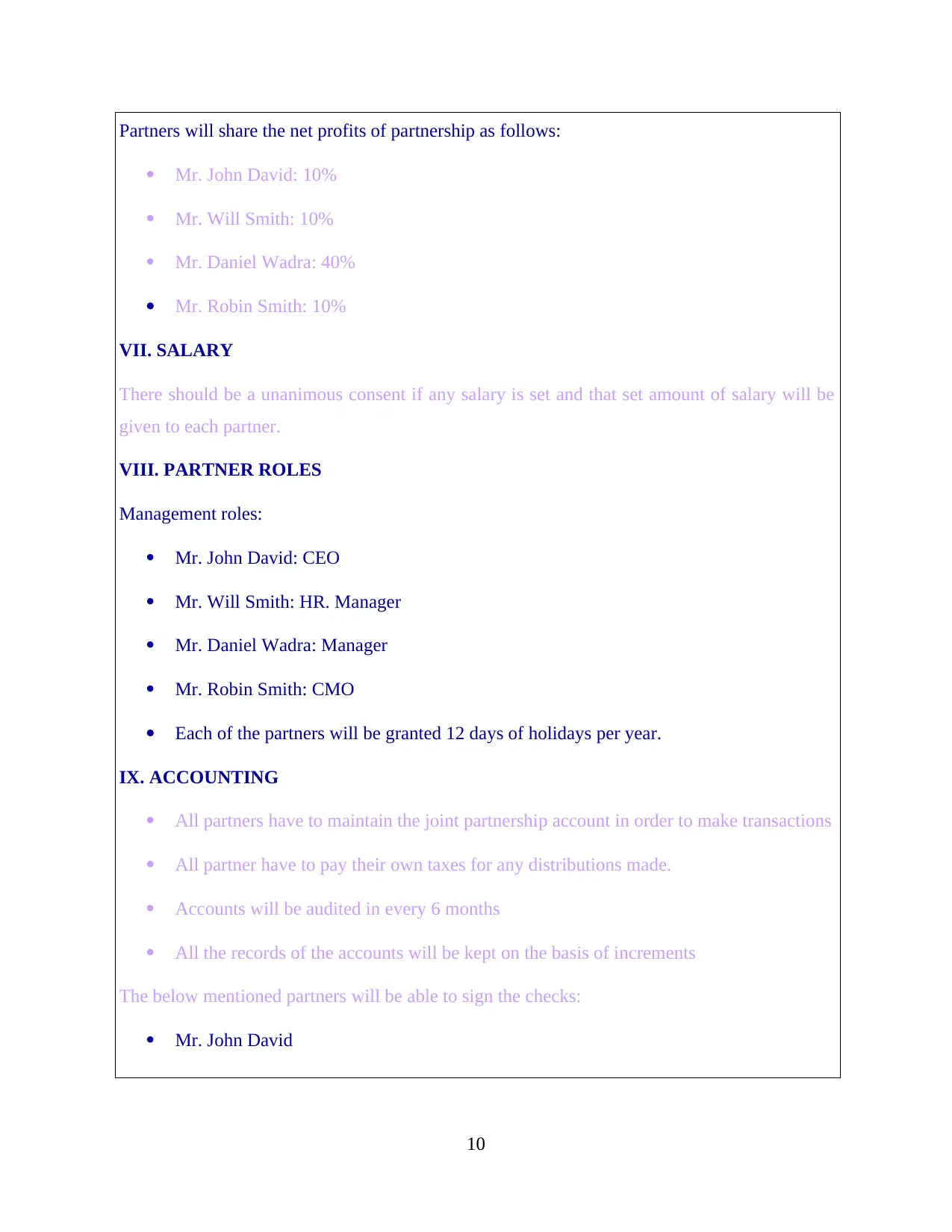
Partners will share the net profits of partnership as follows:
Mr. John David: 10%
Mr. Will Smith: 10%
Mr. Daniel Wadra: 40%
Mr. Robin Smith: 10%
VII. SALARY
There should be a unanimous consent if any salary is set and that set amount of salary will be
given to each partner.
VIII. PARTNER ROLES
Management roles:
Mr. John David: CEO
Mr. Will Smith: HR. Manager
Mr. Daniel Wadra: Manager
Mr. Robin Smith: CMO
Each of the partners will be granted 12 days of holidays per year.
IX. ACCOUNTING
All partners have to maintain the joint partnership account in order to make transactions
All partner have to pay their own taxes for any distributions made.
Accounts will be audited in every 6 months
All the records of the accounts will be kept on the basis of increments
The below mentioned partners will be able to sign the checks:
Mr. John David
10
Mr. John David: 10%
Mr. Will Smith: 10%
Mr. Daniel Wadra: 40%
Mr. Robin Smith: 10%
VII. SALARY
There should be a unanimous consent if any salary is set and that set amount of salary will be
given to each partner.
VIII. PARTNER ROLES
Management roles:
Mr. John David: CEO
Mr. Will Smith: HR. Manager
Mr. Daniel Wadra: Manager
Mr. Robin Smith: CMO
Each of the partners will be granted 12 days of holidays per year.
IX. ACCOUNTING
All partners have to maintain the joint partnership account in order to make transactions
All partner have to pay their own taxes for any distributions made.
Accounts will be audited in every 6 months
All the records of the accounts will be kept on the basis of increments
The below mentioned partners will be able to sign the checks:
Mr. John David
10
⊘ This is a preview!⊘
Do you want full access?
Subscribe today to unlock all pages.

Trusted by 1+ million students worldwide
1 out of 19
Related Documents
Your All-in-One AI-Powered Toolkit for Academic Success.
+13062052269
info@desklib.com
Available 24*7 on WhatsApp / Email
![[object Object]](/_next/static/media/star-bottom.7253800d.svg)
Unlock your academic potential
Copyright © 2020–2026 A2Z Services. All Rights Reserved. Developed and managed by ZUCOL.





